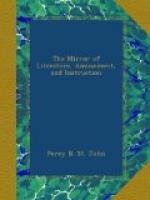* * * * *
SPIRIT OF THE PUBLIC JOURNALS.
* * * * *
MR. ABERNETHY.
Of Mr. Abernethy’s independence and strict veneration of what is right, we have many examples. Among others, the following is characteristic:—A certain noble personage, now enjoying a situation of great responsibility in the Sister Kingdom, had been waiting for a long time in the surgeon’s anteroom, when, seeing those who had arrived before him, successively called in, he became somewhat impatient, and sent his card in. No notice was taken of the hint; he sent another card—another—another—and another; still no answer. At length he gained admission in his turn; and, full of nobility and choler, he asked, rather aristocratically, why he had been kept waiting so long?—“Wh—ew!” responded the professor; “because you didn’t come sooner, to be sure. And now, if your lordship will sit down, I will hear what you have to say.”
One thing Mr. Abernethy cannot abide, that is, any interruption to his discourse. This it is, in fact, which so often irritates him, so often causes him to snarl.—“People come here,” he has often said to us, “to consult me, and they will torture me with their long and foolish fiddle-de-dee stories; so we quarrel, and then they blackguard me all about this large town; but I can’t help that.”
That Abernethy is odd all the world knows, but his oddity is far more amusing than repulsive, far more playful than bearish. Yates’s picture of him last year was not bad; neither was it good—it wanted the raciness of the original. Let the reader imagine a smug, elderly, sleek, and venerable-looking man, approaching seventy years of age, rather (as novel-writers say) below than above the middle height, somewhat inclined to corpulency, and upright in his carriage withal; with his hair most primly powdered, and nicely curled round his brow and temples: let them imagine such a person habited in sober black, with his feet thrust carelessly into a pair of unlaced half-boots, and his hands into the pockets of his “peculiars,” and they have the “glorious John” of the profession before their eyes. The following colloquy, which occurred not many days since, between him and a friend of ours, is so characteristic of the professor, that we cannot resist its insertion:—
Having entered the room, our friend “opened the proceedings.” “I wish you to ascertain what is the matter with my eye, sir. It is very painful, and I am afraid there is some great mischief going on.”—“Which I can’t see,” said Abernethy, placing the patient before the window, and looking closely at the eye.—“But—” interposed our friend.—“Which I can’t see,” again said, or rather sung the professor. “Perhaps not, sir, but—“—“Now don’t bother!” ejaculated the other; “but sit down, and I’ll tell you all about it.” Our friend sat down accordingly, while Abernethy,




